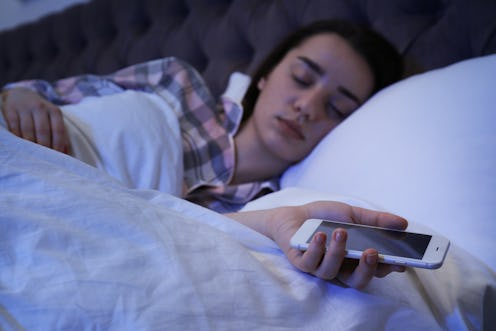Life
What Having Your Phone Next To You Does To Your Sleep Each Night
Experts explain.

Nothing feels quite as comforting as sleeping next to your phone. It's there to entertain you before bed. It's there to play soothing rain sounds. And it's there to wake you up in the morning. But for all the positives that hunk of metal brings, as it gently rests on your pillow or nightstand, there are all sorts of negative ways having your phone next to you impacts your sleep.
There are so many studies that have shown how using your phone right before bed tends to lead to sleep issues, including making it tricky to fall asleep. This is due, in part, to how stimulating it is to text and scroll and read. So even if you're just lying in bed and calmly scanning inspiring photos, you're still using your brain and engaging in a way that doesn't typically promote sleep.
Having your phone nearby when you're falling asleep also makes it more likely you'll take a quick look at work emails, get caught up in a group text, or fall down a news rabbit hole. On top of that, "seeing activity on your phone can increase the feeling of pressure to be available 24/7," Rose MacDowell, a sleep expert and chief research officer at Sleepopolis, a sleep product review and tips site, tells Bustle. And that can result in stress that makes drifting off even tougher.
But even worse, according to studies, is that pesky blue light coming from the screen. "When you stare at a phone, it emits a blue light, which prevents your body from producing melatonin," Ibinye Osibodu-Onyali, LMFT, a licensed marriage and family therapist and owner of The Zinnia Practice, tells Bustle. "Melatonin is the hormone that regulates sleep and allows you to get refreshing rest." Without it, you might find yourself lying awake for hours on end (possibly with phone in hand) or waking up feeling groggy.
That's why Osibodu-Onyali recommends putting your phone away about an hour before climbing into bed, as that will give your body enough time to produce melatonin. It can be a tricky habit to break, but if you slowly replace playing with your phone with non-screen activities, like reading a book or doing a chill hobby, you'll likely notice a big difference in your sleep.
But even if you're someone who doesn't really look at their phone much at night, simply having it nearby can still be enough to disturb sleep. Should it buzz or ring, it'll "alert your body to wake up, rather than to relax into a peaceful sleep," Osibodu-Onyali says. "Note that vibrate mode can also be problematic if your phone is next to you, as the buzzing sound could still disrupt your sleep."
And this is true even if you turn off all your notifications and put it on silent. When you get a message and your phone lights up in a dark room, that tiny amount of light can still pass through your eyelids, Osibodu-Onyali says, and mess up sleep. You might not remember it happening, but you will notice the side effects of disturbed sleep, like a general sense of fatigue in the morning.
Despite the stress, light, and noise, you still have to admit there are quite a few perks of having your phone nearby at night. "Phones have alarms to make sure you wake up on time and you get emergency messages right away," Liz Brown, a certified sleep science coach and founder of SleepingLucid, a company that aims to raise sleep problem awareness, tells Bustle. It can also be nice to play those aforementioned soothing rain soundtracks as you drift off to sleep.
"This is where the ‘compromise’ comes in," Brown says. To get these perks, you may want to keep your phone in the same room, she says, but at a distance where you can't reach it from bed. This will prevent you from reaching out and checking it at night, which is guaranteed to wake you up. And it'll make it less likely that any light stays out of your eyes.
When it comes to things like this, you just have to find a balance. If you want to turn your phone off or stash it in another room, and rely on an old-school alarm clock, do that. If you want to keep it face down on your nightstand, do that. It's all about experimenting and figuring out what works best for you, in the name of getting a good night's sleep.
Studies Referenced:
Mohammed, Khan, M. (2015). Mobile Devices and Insomnia: Understanding Risks and Benefits. Curr Sleep Med Rep. 1(4): 226-231. doi: 10.1007/s40675-015-0027-7
Experts:
Rose MacDowell, sleep expert and chief research officer at Sleepopolis
Ibinye Osibodu-Onyali, LMFT, licensed marriage and family therapist at The Zinnia Practice
Liz Brown, certified sleep science coach and founder of SleepingLucid
This article was originally published on